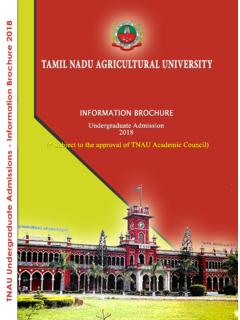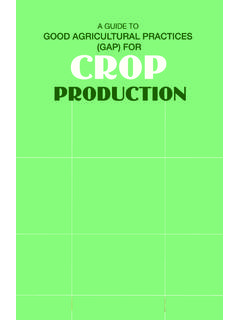Transcription of B.Sc.(Horticulture)
1 (Horticulture). Syllabus I Year I Semester Sl. Course Credit Course Title No. Number Hours 1. FSC 101 Fundamentals of Horticulture 2+1. 2. VSC 101 Botany of Horticultural crops 1+1. 3. SAC 101 Principles of Analytical Chemistry 1+1. 4. AGM 101 Agricultural Microbiology 2+1. 5. MAT 111 Applied Mathematics 1+1. 6. COM 111 Fundamentals of Information 1+1. Technology 7. ENG 101 English for Effective Communication 0+1. 8. PED 101 Physical Education 0+1. 9. NSS 101 National Service Scheme 0+1. Total 8+9=17. FSC 101 FUNDAMENTALS OF HORTICULTURE 2 + 1.
2 Aim To teach the basic and fundamental aspects of horticulture Theory Unit I Basic concepts of horticulture Scope and importance Global scenario of horticultural crops- Divisions of horticulture - area and production export and import - classification of horticultural crops Nutritive value of horticultural crops horticultural therapy Horticulture Zones of India and Tamil Nadu Horticultural developmental agencies Unit II Soil and climatic factors on crop production Influence of soil physical and chemical properties and climatic factors light, temperature, photoperiod, relative humidity, rainfall, micro climate, pollution.
3 Influence of biotic and abiotic stresses on crop production Unit III Nursery techniques and cropping systems Nursery techniques vegetable garden Nutrition garden, kitchen garden and other types of gardens - planting systems planning, layout and management of an orchard- wind breaks - after-cultural practices clonal orchards- use of growth regulators water management drip and fertigation - weed management - nutrient management - soil fertility management - cropping systems - intercropping - multi-tier cropping Unit IV Growth and development Important phases of growth and development - bearing habits - Principles and methods of pruning and training of horticultural crops rejuvenation of old and senile orchards- factors influencing fruitfulness and
4 Unfruitfulness special horticultural practices Unit V Protected cultivation and post harvest handling Protected cultivation principles of organic horticulture hydroponics - harvesting and post harvest handling processing, value addition, storage and marketing of horticultural produce. Practical Features of orchard - planning and layout of orchard Tools and implements . layout of nutrition garden preparation of nursery beds sowing vegetable seeds . digging pits for fruit plants and planting - layout of irrigation systems - preparation and application of fertilizer mixtures preparation and application of growth regulators identification and management of nutritional disorder in fruits and vegetables - assessment of bearing habits practice in training and pruning of fruit crops structures for protected cultivation study of maturity standards harvesting, grading, packing and storage of horticultural crops.
5 Lecture schedule 1. Scope, importance and divisions of Horticulture 2. Global and national scenario of area, production, export and import of horticultural crops 3. Classification and Nutritive value of horticultural crops 4. Horticultural therapy 5. Horticulture zones of India and TamilNadu 6. National and state level agencies involved in Horticultural development 7. Role of soil physical and chemical properties in horticultural crop production 8. Role of climatic factors in horticultural crop production 9. Biotic stress and management in horticultural crops 10.
6 Abiotic stress and management in horticultural crops 11. Nursery techniques and production of healthy planting materials 12. Vegetable gardens nutrition garden, kitchen garden and other types of gardens 13. Planning, layout and management of an orchard 14. Planting systems and planting 15. After cultural practices and clonal orchards 16. Growth regulators and their role in horticulture crops 17. Mid semester examination 18. Water management including drip irrigation and fertigation system in horticultural crops 19. Weed management in horticultural crops 20.
7 Nutrient management and fertigation in horticultural crops 21. Soil fertility management and fertigation in horticultural crops 22. Cropping systems intercropping and multi-tier cropping and mulching 23. Growth and development including bearing habits of horticultural crops 24. Principles and methods of training in horticultural crops 25. Principles and methods of pruning in horticultural crops 26. Factors influencing fruitfulness and unfruitfulness in major horticultural crops 27. Rejuvenation of old, unproductive orchards 28.
8 Special horticultural practices 29. Protected cultivation in horticultural crops 30. Organic horticulture 31. Hydroponics in horticultural crops 32. Harvesting and post harvest handling of horticultural crops 33. Processing and value addition of horticultural crops 34. Marketing and storage of horticultural crops Practical schedule 1. Study of different features of an orchard 2. Planning and layout of orchard 3. Planning and layout of orchard Advanced 4. Tools and implements used in cultivation 5. Layout of nutrition garden 6.
9 Preparation of nursery bed and sowing of vegetable seeds 7. Preparation of pits and planting of fruit plants 8. Layout of different irrigation systems and irrigation methods 9. Preparation of fertilizer mixtures and method of application 10. Preparation and application of growth regulators 11. Identification and correction of nutritional and physiological disorders 12. Study of bearing habits in horticultural crops 13. Methods of training and pruning in horticultural crops 14. Observation of structures used in protected cultivation and storage structures 15.
10 Study of maturity standards, harvesting, grading, packing and storage of horticultural crops 16. Visit to private orchards and cold storage unit 17. Practical Examination Outcome After completion of this course, the students will acquire basic knowledge about the fundamental aspects of horticulture. The students in turn will find it easier to undergo other horticultural courses in the following semesters. Text Books 1. Adams, and M. P. Early. 2004. Principles of horticulture. Butterworth . Heinemam, Oxford University Press. 2.




